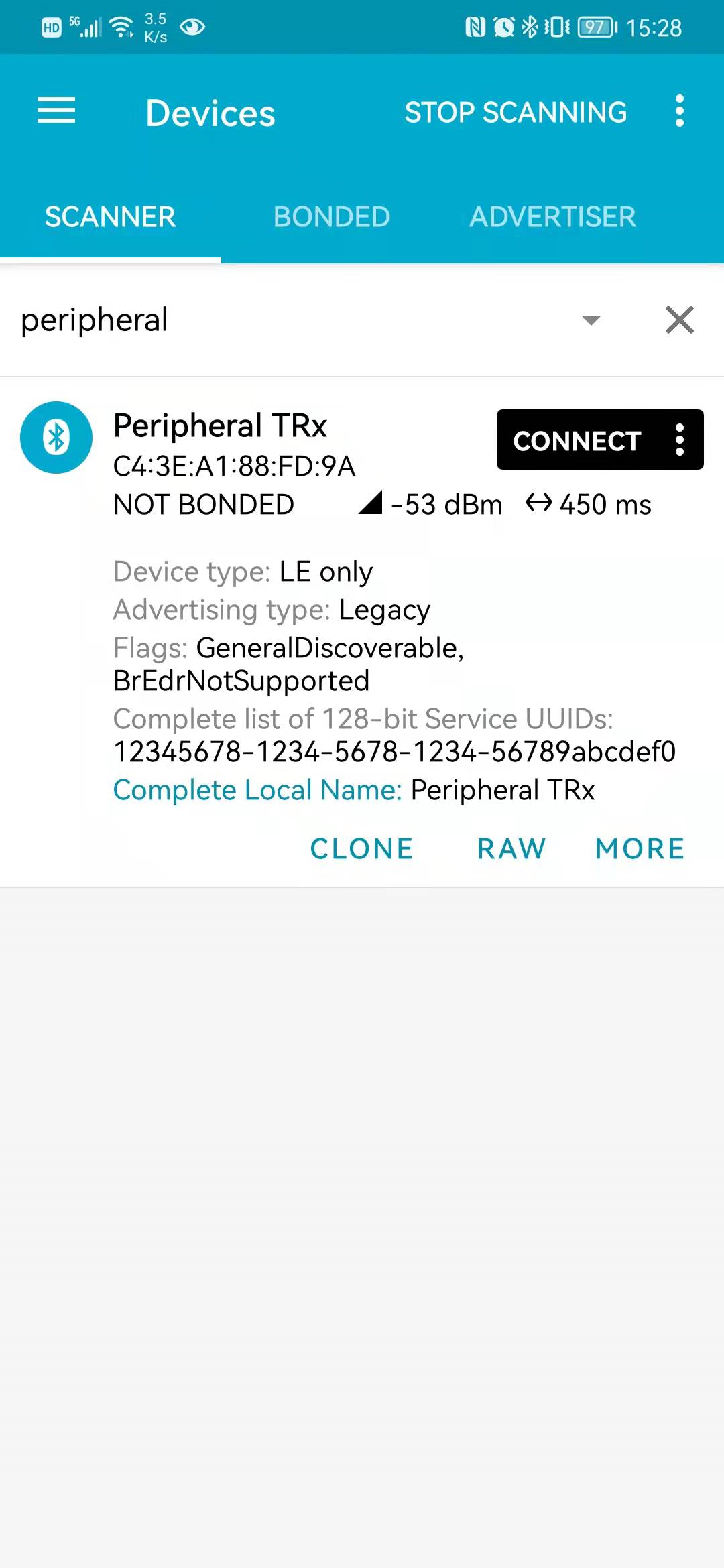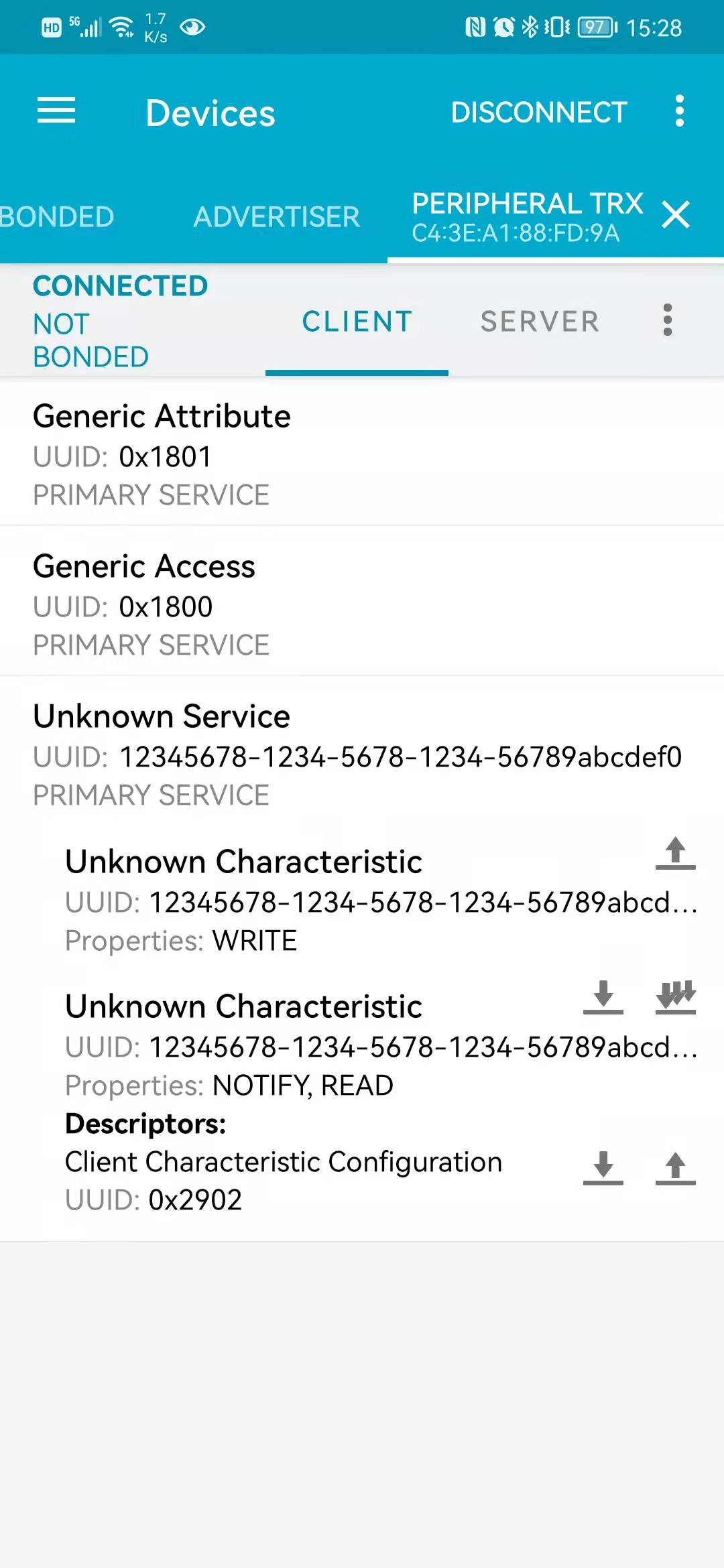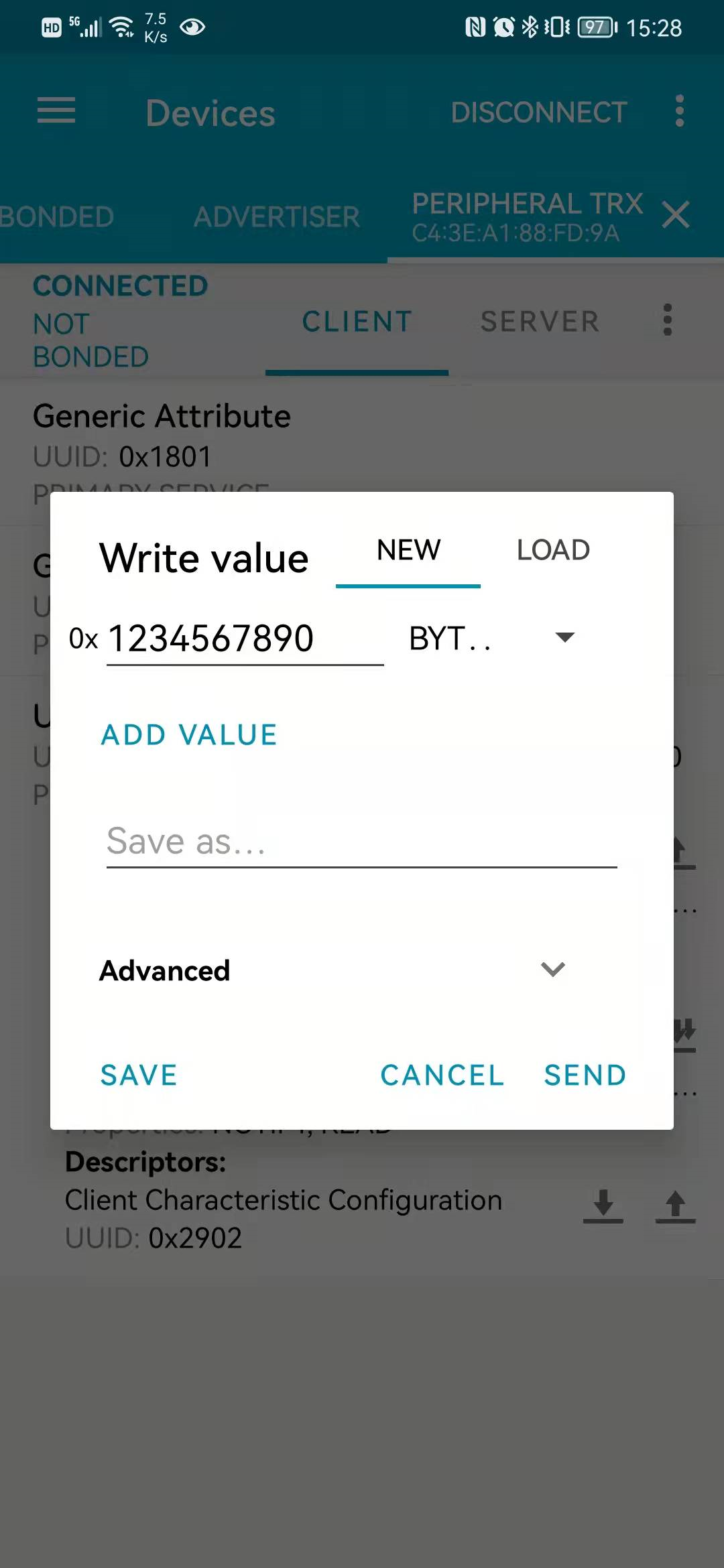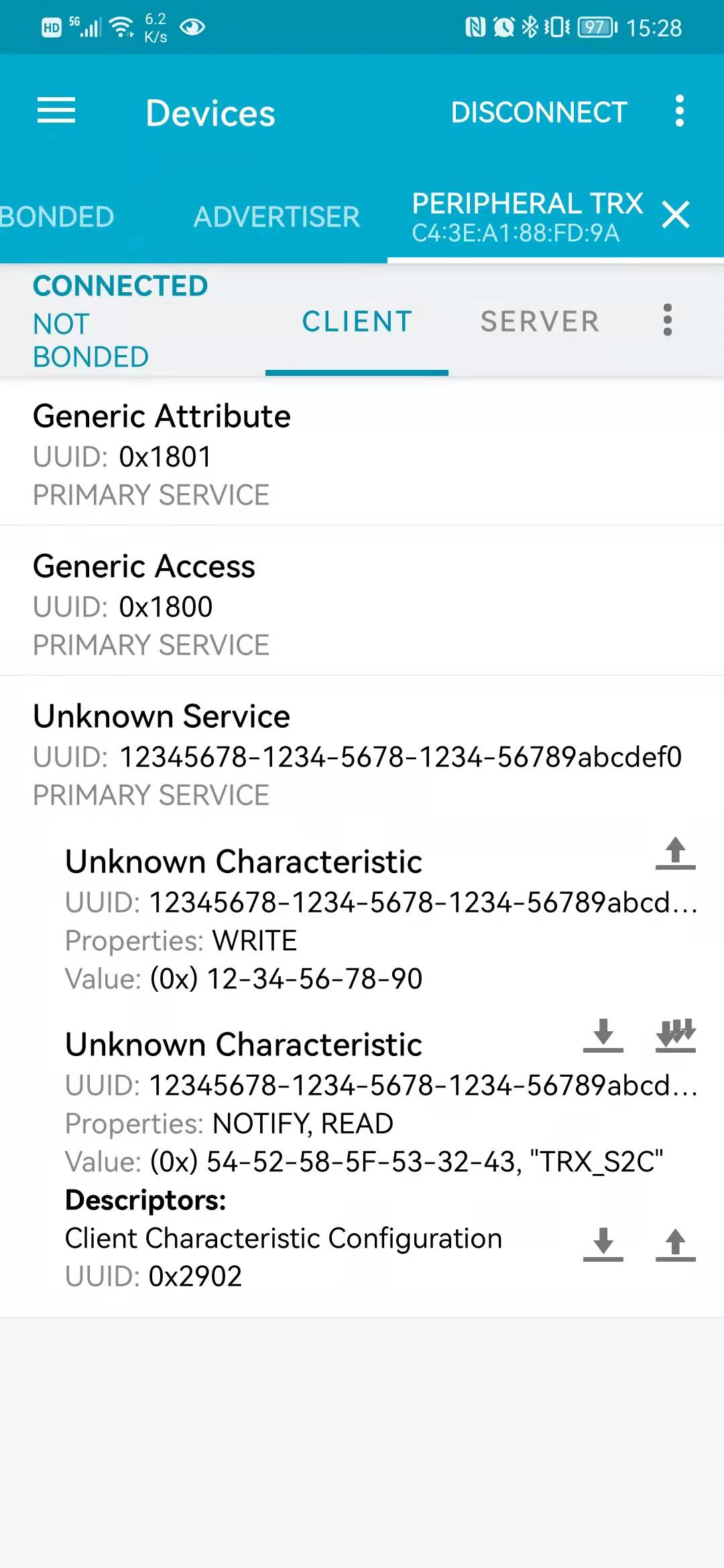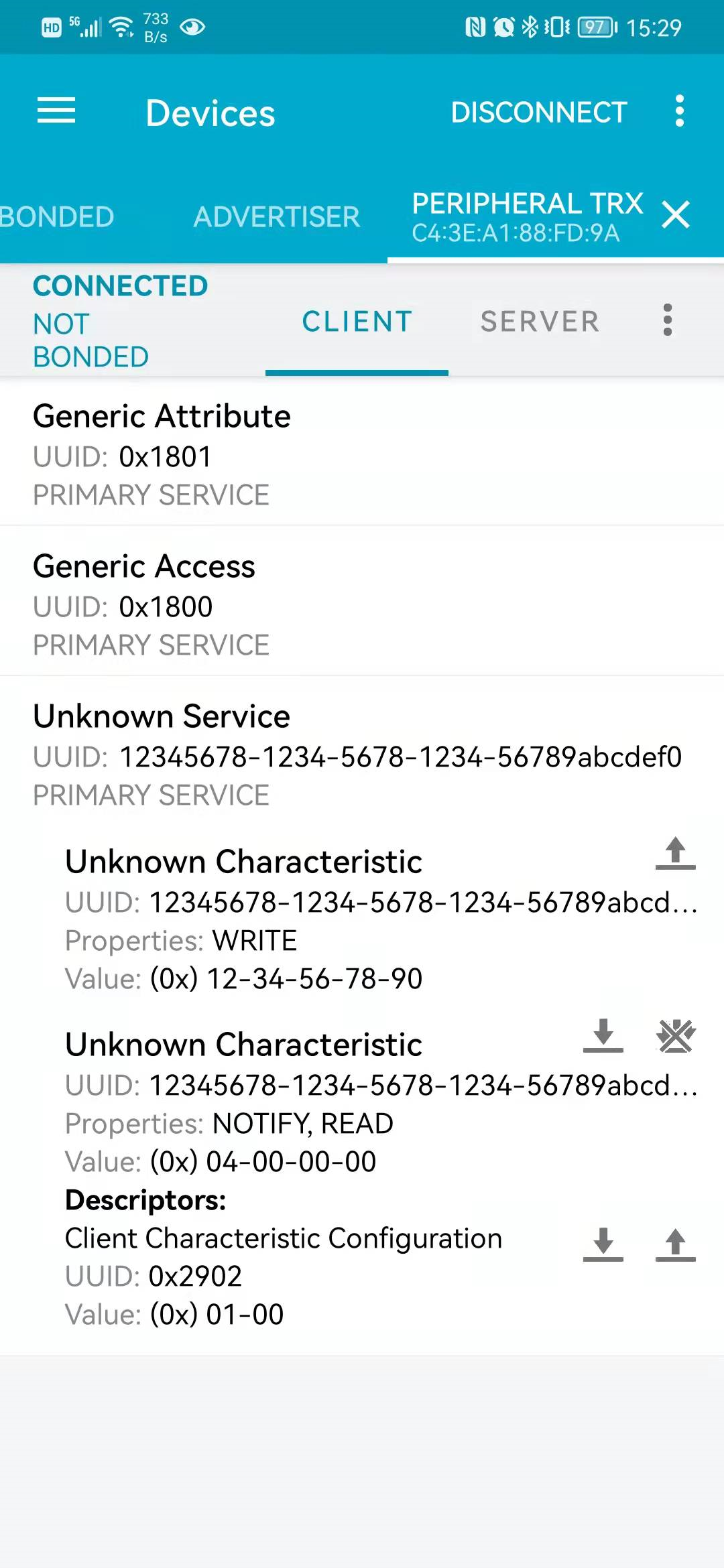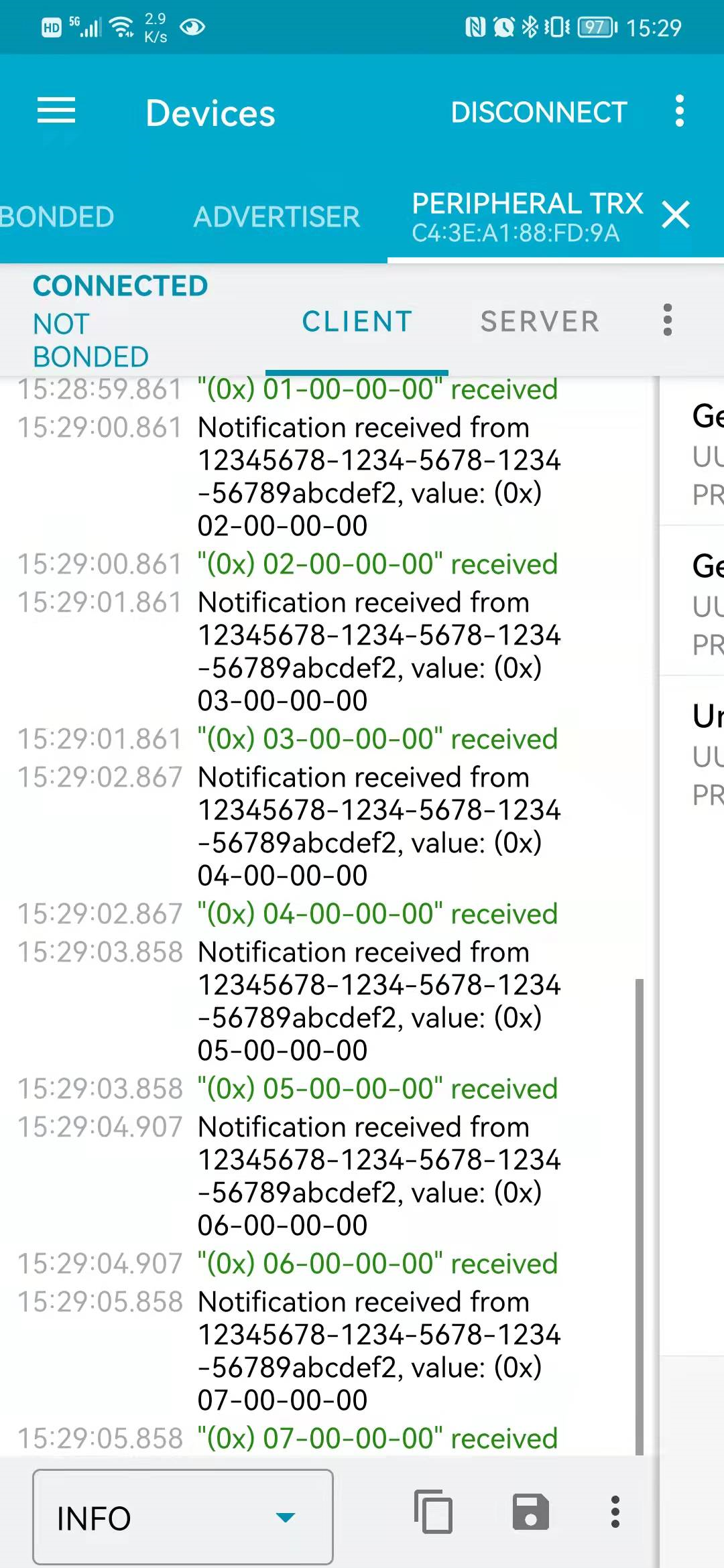BLE App 开发指南¶
本文主要通过一些示例,介绍蓝牙应用开发过程中常用的方法以及可能遇到的问题。
1 基础指标¶
1.1 功耗¶
蓝牙在不同的工作模式下功耗如下表所示:
测试条件:
基于例程
bluetooth\peripheral_hr, 配置文件prj_lp_rcl.conf/prj_lp_xtl.conf发射功率:0 dBm,广播数据:13 Bytes,广播扫描数据:23 Bytes,其它参数请参考项目文件
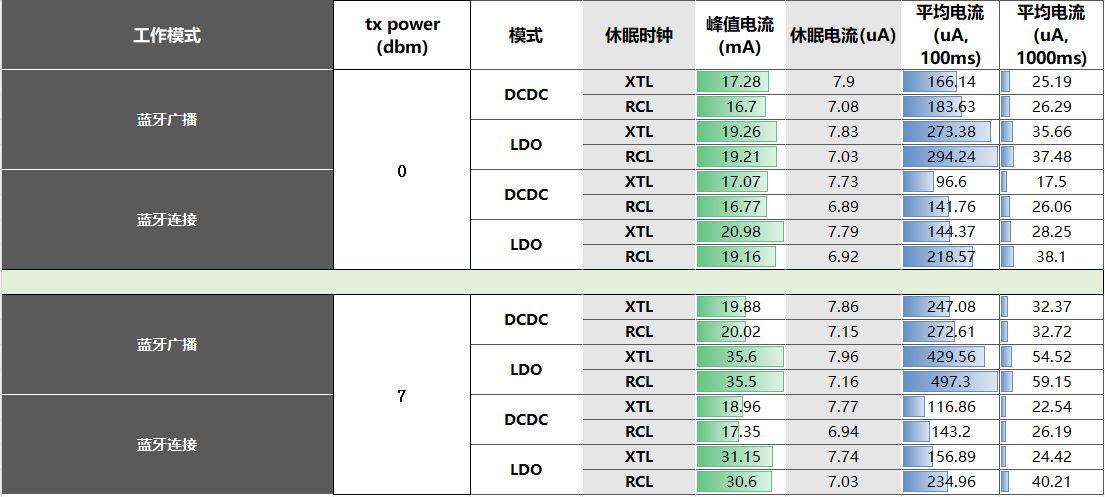
PAN1080/PAN1081 EVB 核心板功耗测试数据¶

PAN1080/PAN1081 EVB 核心板配置latency功耗测试数据¶

PAN1082 EVB 核心板功耗测试数据¶

PAN1083 EVB 核心板功耗测试数据¶

PAN3730 EVB 核心板功耗测试数据¶
注意:上述测试中,RCL 使用 1000ppm 的配置,实际项目中可根据方案实际情况,适当调整 ppm。 例如 1s interval 1000ppm 连接状态下的功耗相比于 2000ppm,平均电流大约可以减少20ua。
1.2 RSSI¶
PAN1080 在天线直连模式下测试,RSSI 精度在 ±2 dB。在蓝牙扫描模式下,使用板载天线测试不同距离下ibeacon的RSSI分布,测试数据如下表:
以下数据基于例程
bluetooth\central进行接受空中ibeacon的测试 ,测试扫描使用的是channel37单通道(adv实际3通道发射功率会略有差异)。
类别 |
3米 |
5米 |
8米 |
10米 |
13米 |
15米 |
|---|---|---|---|---|---|---|
平均值(dBm) |
-66.3253012 |
-67.98387097 |
-69.18181818 |
-73.05084746 |
-75.6 |
-76.76136364 |
总体方差 |
0.886422806 |
0.85179006 |
0.97404329 |
0.928343318 |
0.771669272 |
0.881654862 |
2 添加GATT服务¶
2.2 参考相关例程¶
蓝牙开发需要了解一些蓝牙协议相关的知识,可以参考蓝牙协议规范,网上也有很多协议的介绍,此处不作为重点。
当前SDK中提供了一些蓝牙相关的例程,涵盖了 beacon、central、peripheral、hid、mesh 等。
在进行蓝牙开发之前,建议先看一下相关的例程和文档,磨刀不误砍柴工,相信这些例程会对你的开发有所帮助。

蓝牙例程目录¶
2.3 新建一个蓝牙例程¶
在对蓝牙协议以及相关例程有一些了解之后,就可以尝试进行开发了,这里我们演示一个蓝牙收、发服务例程,具体服务描述如下:
Service or Characteristic |
UUID |
Properties |
|---|---|---|
T/Rx Service |
0x12345678-1234- 5678-1234-56789abcdef0 |
|
Data From Client to Server Characteristic |
0x12345678-1234- 5678-1234-56789abcdef1 |
Write |
Data From Server to Client Characteristic |
0x12345678-1234- 5678-1234-56789abcdef2 |
Read, Notify |
2.3.1 拷贝一份相似的工程¶
当然你也可以在原有例程上进行修改,初期并不建议开发者从头开始进行开发。
例程 peripheral_hr 演示了简单的健康温度计(Health Thermometer)服务,可以在建立连接后将采集温度并上报给主机,我们将以这个例程为基础,来进行修改和补充,首先拷贝一份 peripheral_hr 并重命名为 peripheral_trx。

拷贝一份相似的工程¶
其中的 必要的文件为:
src\main.c: 主程序代码CMakeList.txt: cmake 文件prj.conf: 项目配置文件
其它几个文件都不是必须的:
prj_minimal.conf: 编译阶段可选的项目配置文件README.rst: 项目说明文件sample.yaml: 用于 zephyr tests 的文件
2.3.2 进行必要的调整¶
(1) 为了简单起见,我们删掉不必要的文件。
删掉 prj_minimal.conf,README.rst,sample.yaml。

只保留必要的文件¶
(2) 在 CMakeList.txt 文件中修改项目名称为 peripheral_trx。
## SPDX-License-Identifier: Apache-2.0
cmake_minimum_required(VERSION 3.20.0)
find_package(Zephyr REQUIRED HINTS $ENV{ZEPHYR_BASE})
project(peripheral_trx)
FILE(GLOB app_sources src/*.c)
target_sources(app PRIVATE
${app_sources}
)
zephyr_library_include_directories(${ZEPHYR_BASE}/samples/bluetooth)
(3) 在 prj.conf 中修改项目的配置,关闭不必要的配置。
CONFIG_BT=y
CONFIG_BT_DEBUG_LOG=y
CONFIG_BT_PERIPHERAL=y
CONFIG_BT_DEVICE_NAME="Peripheral TRx"
CONFIG_BT_DEVICE_NAME_DYNAMIC=y
CONFIG_BT=y: 使能蓝牙CONFIG_BT_DEBUG_LOG=y: 使能蓝牙 logCONFIG_BT_PERIPHERAL=y: 使能 peripheralCONFIG_BT_DEVICE_NAME="Peripheral TRx": 修改蓝牙设备名称
(4) 在 main.c 中删掉不必要的代码,如原来代码中关于 BAS、HRS、AUTH 相关的内容。
#include <zephyr/types.h>
#include <stddef.h>
#include <string.h>
#include <errno.h>
#include <sys/printk.h>
#include <sys/byteorder.h>
#include <zephyr.h>
#include <bluetooth/bluetooth.h>
#include <bluetooth/hci.h>
#include <bluetooth/conn.h>
#include <bluetooth/uuid.h>
#include <bluetooth/gatt.h>
static const struct bt_data ad[] = {
BT_DATA_BYTES(BT_DATA_FLAGS, (BT_LE_AD_GENERAL | BT_LE_AD_NO_BREDR)),
};
static void connected(struct bt_conn *conn, uint8_t err)
{
if (err) {
printk("Connection failed (err 0x%02x)\n", err);
} else {
printk("Connected\n");
}
}
static void disconnected(struct bt_conn *conn, uint8_t reason)
{
printk("Disconnected (reason 0x%02x)\n", reason);
}
BT_CONN_CB_DEFINE(conn_callbacks) = {
.connected = connected,
.disconnected = disconnected,
};
static void bt_ready(void)
{
int err;
printk("Bluetooth initialized\n");
err = bt_le_adv_start(BT_LE_ADV_CONN_NAME, ad, ARRAY_SIZE(ad), NULL, 0);
if (err) {
printk("Advertising failed to start (err %d)\n", err);
return;
}
printk("Advertising successfully started\n");
}
void main(void)
{
int err;
err = bt_enable(NULL);
if (err) {
printk("Bluetooth init failed (err %d)\n", err);
return;
}
bt_ready();
}
上述代码比较简单,但有个点需要说明一下:
你可以使用
BT_CONN_CB_DEFINE来为连接事件注册回调函数,但却不需要对它进行额外的初始化;系统会将用这种方法定义的回调函数放到特定代码空间进行统一处理。初次接触的开发者可能会感到困惑,但它会很方便,特别是多个文件都需要处理这个回调函数时,只需要按照同样的方式处理即可。
(5) 重新编译和下载例程
此时我们重新编译 (rebuild),并下载。
下载成功,系统执行起来以后,串口工具将显示如下 Log:
*** Booting Zephyr OS version 2.7.0 ***
Bluetooth initialized
Advertising successfully started
[00:00:00.186,000] <inf> bt_hci_core: Identity: C4:3E:A1:88:FD:9A (random)
[00:00:00.186,000] <inf> bt_hci_core: HCI: version 5.1 (0x0a) revision 0x0003, manufacturer 0x07d1
[00:00:00.187,000] <inf> bt_hci_core: LMP: version 5.1 (0x0a) subver 0x0000
手机端可以通过 nRF Connect APP 进行搜索、连接蓝牙设备
注意,非HID相关的例程,不建议通过手机设置界面 查看和连接蓝牙设备,因为这可能涉及到一些手机系统的设备过滤和功能要求。

nRF Connect 搜索广播¶

nRF Connect 成功连接并显示Service信息¶
2.3.3 添加GATT服务¶
(1) 定义 UUID
/* TRx Service Variables */
#define BT_UUID_TRX_SERVICE_VAL \
BT_UUID_128_ENCODE(0x12345678, 0x1234, 0x5678, 0x1234, 0x56789abcdef0)
static struct bt_uuid_128 trx_svc_uuid = BT_UUID_INIT_128(
BT_UUID_TRX_SERVICE_VAL);
static struct bt_uuid_128 trx_c2s_uuid = BT_UUID_INIT_128(
BT_UUID_128_ENCODE(0x12345678, 0x1234, 0x5678, 0x1234, 0x56789abcdef1));
static struct bt_uuid_128 trx_s2c_uuid = BT_UUID_INIT_128(
BT_UUID_128_ENCODE(0x12345678, 0x1234, 0x5678, 0x1234, 0x56789abcdef2));
这里把 BT_UUID_TRX_SERVICE_VAL 单独列出来,是为了后面加到广播数据中,以暴露此服务。
(2) 定义 GATT 服务
可以使用 BT_GATT_SERVICE_DEFINE 来定义服务,它和前面介绍的 BT_CONN_CB_DEFINE 一样,将被系统放到特定代码空间,不需要额外初始化。
定义了三个 buffer 来存放 待收发的数据:trx_c2s_value,trx_s2c_value,trx_s2c_ntf_value。
定义了三个接口,处理数据收发:write_trx_c2s,read_trx_s2c,trx_s2c_ccc_cfg_changed。
GATT 服务一般要包含:BT_GATT_PRIMARY_SERVICE, BT_GATT_CHARACTERISTIC,包含 notify / indicate 时,还需要用到 BT_GATT_CCC 来进行管理是否使能。
更多的示例,请参考例程 bluetooth\peripheral。
#define TRX_MAX_LEN 20
static uint8_t trx_c2s_value[TRX_MAX_LEN + 1] = {
'T', 'R', 'X', '_', 'C', '2', 'S'
};
static uint8_t trx_s2c_value[TRX_MAX_LEN + 1] = {
'T', 'R', 'X', '_', 'S', '2', 'C'
};
static uint32_t trx_s2c_ntf_value;
static ssize_t write_trx_c2s(struct bt_conn *conn, const struct bt_gatt_attr *attr,
const void *buf, uint16_t len, uint16_t offset,
uint8_t flags)
{
uint8_t *value = attr->user_data;
if (offset + len > TRX_MAX_LEN) {
return BT_GATT_ERR(BT_ATT_ERR_INVALID_OFFSET);
}
memcpy(value + offset, buf, len);
value[offset + len] = 0;
printk("write (%d): ", len);
for (uint8_t i = 0; i < len; i++)
{
printk("0x%02X ", value[i]);
}
printk("\n");
return len;
}
static ssize_t read_trx_s2c(struct bt_conn *conn, const struct bt_gatt_attr *attr,
void *buf, uint16_t len, uint16_t offset)
{
const char *value = attr->user_data;
return bt_gatt_attr_read(conn, attr, buf, len, offset, value,
strlen(value));
}
static uint8_t simulate;
static void trx_s2c_ccc_cfg_changed(const struct bt_gatt_attr *attr, uint16_t value)
{
simulate = (value == BT_GATT_CCC_NOTIFY) ? 1 : 0;
}
/* TRx Primary Service Declaration */
BT_GATT_SERVICE_DEFINE(trx_svc,
BT_GATT_PRIMARY_SERVICE(&trx_svc_uuid),
BT_GATT_CHARACTERISTIC(&trx_c2s_uuid.uuid,
BT_GATT_CHRC_WRITE, BT_GATT_PERM_WRITE,
NULL, write_trx_c2s, trx_c2s_value),
BT_GATT_CHARACTERISTIC(&trx_s2c_uuid.uuid,
BT_GATT_CHRC_READ | BT_GATT_CHRC_NOTIFY,
BT_GATT_PERM_READ,
read_trx_s2c, NULL, trx_s2c_value),
BT_GATT_CCC(trx_s2c_ccc_cfg_changed,
BT_GATT_PERM_READ | BT_GATT_PERM_WRITE),
);
(3) 定义接口
这里定义了两个接口:
trx_init:初始化 notify attributetrx_notify:上报数据给 client
static struct bt_gatt_attr *trx_ntf_attr;
static void trx_init(void)
{
trx_ntf_attr = bt_gatt_find_by_uuid(trx_svc.attrs, trx_svc.attr_count, &trx_s2c_uuid.uuid);
}
static void trx_notify(void)
{
if (simulate) {
bt_gatt_notify(NULL, trx_ntf_attr, &trx_s2c_ntf_value, sizeof(trx_s2c_ntf_value));
trx_s2c_ntf_value++;
}
}
(4) 修改广播数据
添加了 TRx Service UUID,以便在广播数据中发现它。
static const struct bt_data ad[] = {
BT_DATA_BYTES(BT_DATA_FLAGS, (BT_LE_AD_GENERAL | BT_LE_AD_NO_BREDR)),
BT_DATA_BYTES(BT_DATA_UUID128_ALL, BT_UUID_TRX_SERVICE_VAL),
};
(5) 初始化 trx service 并 在连接建立且使能 notify 后上报数据
void main(void)
{
int err;
err = bt_enable(NULL);
trx_init();
if (err) {
printk("Bluetooth init failed (err %d)\n", err);
return;
}
bt_ready();
while (1) {
k_sleep(K_SECONDS(1));
trx_notify();
}
}
3 蓝牙相关接口说明¶
3.1 GAP¶
3.1.1 蓝牙地址使用¶
Random Address¶
蓝牙初始化默认使用的是随机地址,随机地址每次蓝牙初始化都不一样。
随机地址初始化是在蓝牙初始化流程中通过调用一个名为
set_random_address()的内部函数实现的。若希望使用不变的随机地址,可在 App
bt_le_adv_start()之前调用bt_static_address_init()接口进行指定,需注意地址的高字节的高 2bit 必须要强制写 1,例如:bt_addr_le_t set_addr = { .type = BT_ADDR_LE_RANDOM, .a = { { 0x01, 0x02, 0x03, 0x04, 0x05, 0xC6 } }, }; bt_static_address_init(&set_addr.a); err = bt_le_adv_start(BT_LE_ADV_PARAM(BT_LE_ADV_OPT_CONNECTABLE, 0x0300, 0x0300, NULL), ad, ARRAY_SIZE(ad), NULL, 0); if (err) { LOG_INF("Advertising failed to start (err %d)\n", err); return; }
Public Address¶
SDK 中对蓝牙 Public 地址提供了 2 种类别的来源:
芯片出厂 MAC 地址
此 MAC 地址在芯片出厂前写入,存储在芯片 eFuse/INFO 区,由 Panchip 保证其唯一性。
在 App 中,可以通过配置
CONFIG_BT_CHIP_DEFINED_PUBLIC_MAC=y的方式使用此地址。小技巧
程序中可以通过全局变量
otp.m.mac_addr的方式获取芯片的出厂 MAC 地址。用户自定义 MAC 地址
这种 MAC 地址由用户指定并自行保证其唯一性,具体又可细分为 3 种方式:
通过 App 代码自定义
先在 App 中使能配置
CONFIG_BT_USER_DEFINED_PUBLIC_MAC=y然后在初始化蓝牙之前,通过
bt_set_user_public_mac()接口传入自定义 MAC 地址:static const uint8_t BLE_MAC_ADDRESS[6] = { 0x29, 0xDD, 0x33, 0x18, 0xB1, 0xAE }; bt_set_user_public_mac(BLE_MAC_ADDRESS); int err = bt_enable(NULL); if (err) { printk("Bluetooth init failed (err %d)\n", err); return; }
使用 Panlink 写入的滚码 MAC 地址
在 App 中,可以通过同时配置
CONFIG_BT_USER_DEFINED_PUBLIC_MAC=y和CONFIG_BT_USER_DEF_PUB_MAC_ROLL=y的方式使用此地址为使用此地址,需要用户在产品量产阶段通过 Panlink 量产烧录工具将滚码 MAC 地址写入芯片 INFO 区中,具体方法请查阅 Panlink 工具说明书
使用随机数
在 App 中,可以通过同时配置
CONFIG_BT_USER_DEFINED_PUBLIC_MAC=y和CONFIG_BT_USER_DEF_PUB_MAC_RANDOM=y的方式使用此地址注意此方式下广播数据包中仍将自己标记为 Public Address,而不是 Random Address
注意:以上 4 种 Public MAC Address 的指定方式是互斥的,同一个 App 工程下面只可使用一种方式,若同时配置了多种方式,则可能会出现非预期的情况。
3.2 GATT¶
16-bit或128-bit的UUID唯一决定了 Service/Characteristic.
16-bit UUID 用于标准 Bluetooth Service/Characteristic
128-bit UUID 用于厂商自定义的一些服务
3.2.1 Bluetooth Service¶
GAP Service¶
这是一个基础服务,默认开启,不建议用户修改。
如果确实需要修改,建议使用 CONFIG_BT_GAP_SERVICE=n 关掉这个服务,然后在应用层重新实现,这样可以避免代码更新导致的冲突。
源码路径:zephyr\subsys\bluetooth\host\gatt.c。
Service or Characteristics |
Kconfig |
Description |
ROM |
SRAM |
|---|---|---|---|---|
GAP Service |
|
Enable GAP service (Enabled by default) |
||
Device Name Characteristic |
|
Device name characteristic (Always enable) |
- |
- |
Appearance Characteristic |
|
Appearance characteristic (Always enable) |
- |
- |
Central Address Resolution Characteristic |
Depends on Central Role & Privacy Feature |
- |
- |
|
Service Changed Characteristic |
Configure peripheral preferred connection parameters |
GATT Service¶
这是一个基础服务,默认开启,不建议用户修改。
如果确实需要修改,建议使用 CONFIG_BT_GATT_SERVICE=n 关掉这个服务,然后在应用层重新实现,这样可以避免代码更新导致的冲突。
源码路径:zephyr\subsys\bluetooth\host\gatt.c。
Service or Characteristics |
Kconfig |
Description |
ROM |
SRAM |
|---|---|---|---|---|
GATT Service |
|
Enable GATT service (Enabled by default) |
||
Service Changed Characteristic |
GATT Service Changed support |
|||
Client Supported Features & Database Hash Characteristic |
GATT Caching support |
|||
Server Supported Features Characteristic |
Enhanced ATT Bearers support [EXPERIMENTAL] |
Battery Service¶
源码路径:zephyr\subsys\bluetooth\services\bas.c。
Service or Characteristics |
Kconfig |
Description |
ROM |
SRAM |
|---|---|---|---|---|
Battery Service |
Enable GATT Battery service |
|||
Battery Level Characteristic |
|
BAS Battery level characteristic (Always enable) |
- |
- |
APIs
bt_bas_get_battery_level
bt_bas_set_battery_level
需要包含头文件
#include <bluetooth/services/bas.h>
Device Information Service¶
源码路径:zephyr\subsys\bluetooth\services\dis.c。
Service or Characteristics |
Kconfig |
Description |
ROM |
SRAM |
|---|---|---|---|---|
Device Information Service |
Enable GATT Device Information service |
|||
Enable Settings usage in Device Information Service |
||||
Maximum size in bytes for DIS strings |
- |
- |
||
Model Number String Characteristic |
|
DIS Model number string characteristic (Always enable) |
- |
- |
Model name |
- |
- |
||
Manufacturer Name String Characteristic |
|
DIS Manufacturer name string characteristic (Always enable) |
- |
- |
Manufacturer name |
- |
- |
||
Firmware Revision String Characteristic |
Enable DIS Firmware Revision characteristic |
|||
Firmware revision |
- |
- |
||
Hardware Revision String Characteristic |
Enable DIS Hardware Revision characteristic |
|||
Hardware revision |
- |
- |
||
PnP ID Characteristic |
Enable PnP_ID characteristic |
|||
Product ID |
- |
- |
||
Product Version |
- |
- |
||
Vendor ID |
- |
- |
||
Vendor ID source |
- |
- |
||
Serial Number String Characteristic |
Enable DIS Serial number characteristic |
|||
Serial Number |
- |
- |
||
Software Revision String Characteristic |
Enable DIS Software Revision characteristic |
|||
Software revision |
- |
- |
Heart Rate Service¶
源码路径:zephyr\subsys\bluetooth\services\hrs.c。
Service or Characteristics |
Kconfig |
Description |
ROM |
SRAM |
|---|---|---|---|---|
Heart Rate Service |
Enable GATT Heart Rate service |
|||
Read and write allowed |
||||
Require encryption and authentication for access |
||||
Require encryption for access |
||||
Measurement Interval Characteristic |
|
HRS Measurement interval characteristic (Always enable) |
- |
- |
Body Sensor Location Characteristic |
|
HRS Body sensor location characteristic (Always enable) |
- |
- |
Control Point Characteristic |
|
HRS Control Point characteristic (Always enable) |
- |
- |
APIs
bt_hrs_notify
需要包含头文件
#include <bluetooth/services/hrs.h>
Object Transfer Service¶
源码路径:zephyr\subsys\bluetooth\services\ots\*。
Service or Characteristics |
Kconfig |
Description |
ROM |
SRAM |
|---|---|---|---|---|
Object Transfer Service |
Object Transfer Service (OTS) [EXPERIMENTAL] |
|||
Enables the Directory Listing Object |
||||
The object name of the Directory Listing Object |
||||
Size of RX MTU for Object Transfer Channel |
||||
Size of TX MTU for Object Transfer Channel |
||||
Maximum number of available OTS instances |
||||
Maximum number of objects that each service instance can store |
||||
Support OACP Create Operation |
||||
Support OACP Delete Operation |
||||
Support patching of objects |
||||
Support OACP Read Operation |
||||
Support OACP Write Operation |
||||
Maximum object name length |
||||
Support object name write |
||||
Support OLCP Go To Operation |
||||
Register OTS as Secondary Service |
||||
OTS Feature Characteristic |
|
OTS Feature characteristic (Always enable) |
- |
- |
OTS Object Name Characteristic |
|
OTS Object name characteristic (Always enable) |
- |
- |
OTS Object Type Characteristic |
|
OTS Object type characteristic (Always enable) |
- |
- |
OTS Object Size Characteristic |
|
OTS Object size characteristic (Always enable) |
- |
- |
OTS Object ID Characteristic |
|
OTS Object ID characteristic (Always enable) |
- |
- |
OTS Object Properties Characteristic |
|
OTS Object properties characteristic (Always enable) |
- |
- |
OTS Object Action Control Point Characteristic |
|
OTS Object action control point characteristic (Always enable) |
- |
- |
OTS Object List Control Point Characteristic |
|
OTS Object list control point characteristic (Always enable) |
- |
- |
APIs
bt_ots_init
bt_ots_obj_add
bt_ots_obj_delete
bt_ots_svc_decl_get
bt_ots_free_instance_get
bt_ots_obj_id_to_str
需要包含头文件
#include <bluetooth/services/ots.h>
3.3 Notify¶
参考 bt_gatt_indicate 参数计算。
int notify_send(const void *data, uint16_t len)
{
return bt_gatt_notify(NULL, &cvs.attrs[1], data, len);
}
3.3 Indicate¶
static void indicate_cb(struct bt_conn *conn,
struct bt_gatt_indicate_params *params, uint8_t err)
{
printk("Indication %s\n", err != 0U ? "fail" : "success");
}
static void indicate_destroy(struct bt_gatt_indicate_params *params)
{
printk("Indication complete\n");
}
int indicate_send(const void *data, uint16_t len)
{
static struct bt_gatt_attr *ind_attr;
static struct bt_gatt_indicate_params ind_params;
vnd_ind_attr = bt_gatt_find_by_uuid(svc.attrs, svc.attr_count,
&chr_uuid.uuid);
ind_params.attr = ind_attr;
ind_params.func = indicate_cb;
ind_params.destroy = indicate_destroy;
ind_params.data = data;
ind_params.len = len;
return bt_gatt_indicate(NULL, &ind_params);
}
3.4 Attribute Index¶
我们在使用 bt_gatt_indicate,bt_gatt_notify 时,需要传入一个参数 attr,这个参数与 GATT Service 的定义有关。下面介绍一下这个参数如何填写。
Service 是多个 Attribute 的集合,为了方便定义,我们使用宏进行组织服务,每个宏包含1或2个Attribute,如下:
宏 |
描述 |
数量 |
|---|---|---|
BT_GATT_PRIMARY_SERVICE |
Primary Service Declaration Macro. |
1 |
BT_GATT_SECONDARY_SERVICE |
Secondary Service Declaration Macro. |
1 |
BT_GATT_INCLUDE_SERVICE |
Include Service Declaration Macro. |
1 |
BT_GATT_CHARACTERISTIC |
Characteristic and Value Declaration Macro. |
2 |
BT_GATT_CCC |
Client Characteristic Configuration Declaration Macro. |
1 |
BT_GATT_CEP |
Characteristic Extended Properties Declaration Macro. |
1 |
BT_GATT_CUD |
Characteristic User Format Descriptor Declaration Macro. |
1 |
BT_GATT_CPF |
Characteristic Presentation Format Descriptor Declaration Macro. |
1 |
BT_GATT_DESCRIPTOR |
Descriptor Declaration Macro. |
1 |
如下是 Battery Service 的定义,源码位置:\subsys\bluetooth\services\bas.c
BT_GATT_SERVICE_DEFINE(bas,
BT_GATT_PRIMARY_SERVICE(BT_UUID_BAS),
BT_GATT_CHARACTERISTIC(BT_UUID_BAS_BATTERY_LEVEL,
BT_GATT_CHRC_READ | BT_GATT_CHRC_NOTIFY,
BT_GATT_PERM_READ, read_blvl, NULL,
&battery_level),
BT_GATT_CCC(blvl_ccc_cfg_changed,
BT_GATT_PERM_READ | BT_GATT_PERM_WRITE),
);
其 Notify Characteristic Attribute index 为 1 (BT_GATT_PRIMARY_SERVICE)。
同样的,如下 hog_svc:
BT_GATT_SERVICE_DEFINE(hog_svc,
BT_GATT_PRIMARY_SERVICE(BT_UUID_HIDS),
BT_GATT_CHARACTERISTIC(BT_UUID_HIDS_INFO, BT_GATT_CHRC_READ,
BT_GATT_PERM_READ, read_info, NULL, &info),
BT_GATT_CHARACTERISTIC(BT_UUID_HIDS_REPORT_MAP, BT_GATT_CHRC_READ,
BT_GATT_PERM_READ, read_report_map, NULL, NULL),
BT_GATT_CHARACTERISTIC(BT_UUID_HIDS_REPORT,
BT_GATT_CHRC_READ | BT_GATT_CHRC_NOTIFY,
BT_GATT_PERM_READ_AUTHEN,
read_input_report, NULL, NULL),
BT_GATT_CCC(input_ccc_changed,
BT_GATT_PERM_READ | BT_GATT_PERM_WRITE),
BT_GATT_DESCRIPTOR(BT_UUID_HIDS_REPORT_REF, BT_GATT_PERM_READ,
read_report, NULL, &input),
BT_GATT_CHARACTERISTIC(BT_UUID_HIDS_REPORT,
BT_GATT_CHRC_READ | BT_GATT_CHRC_NOTIFY,
BT_GATT_PERM_READ_AUTHEN,
read_input_report_consumer, NULL, NULL),
BT_GATT_CCC(input_ccc_changed_consumer,
BT_GATT_PERM_READ | BT_GATT_PERM_WRITE),
BT_GATT_DESCRIPTOR(BT_UUID_HIDS_REPORT_REF, BT_GATT_PERM_READ,
read_report_consumer, NULL, &input_consumer),
BT_GATT_CHARACTERISTIC(BT_UUID_HIDS_CTRL_POINT,
BT_GATT_CHRC_WRITE_WITHOUT_RESP,
BT_GATT_PERM_WRITE,
NULL, write_ctrl_point, &ctrl_point),
);
第一个 Notify Characteristic Attribute index 为 5
BT_GATT_PRIMARY_SERVICE+BT_GATT_CHARACTERISTIC+BT_GATT_CHARACTERISTIC= 1+2+2第二个 Notify Characteristic Attribute index 为 9
BT_GATT_PRIMARY_SERVICE+BT_GATT_CHARACTERISTIC+BT_GATT_CHARACTERISTIC+BT_GATT_CHARACTERISTIC+BT_GATT_CCC+BT_GATT_DESCRIPTOR= 1+2+2+2+1+1
3.5 INFO区 API说明¶
ssize_t hwinfo_get_efuse_mac(uint8_t *buffer, size_t length);
说明:获取EFUSE区域mac地址,其中buffer为存放的变量地址,length必须为固定值6。
ssize_t hwinfo_get_info_mac(uint8_t *buffer, size_t length);
说明:获取INFO区域mac地址,其中buffer为存放的变量地址,length必须为固定值6。INFO区mac地址为0x1B。
ssize_t hwinfo_get_triple(uint8_t read_type, uint8_t *buffer, size_t length);
说明:获取INFO区域三元组变量,read_type为获取三元组变量的类型。其中BLE_INFO_TRIPLE_PID_TYPE和BLE_INFO_TRIPLE_PID_SIZE为PID的类型和长度,BLE_INFO_TRIPLE_MAC_TYPE和BLE_INFO_TRIPLE_MAC_SIZE为MAC的类型和长度,BLE_INFO_TRIPLE_KEY_TYPE和BLE_INFO_TRIPLE_KEY_SIZE为KEY的类型和长度。
ssize_t hwinfo_read(size_t addr, uint8_t *buffer, size_t length);
说明:通用INFO区域读取函数,其中buffer为存放的变量地址,length为读取变量,不要超过4096。
3.6 ADV Filter 功能说明¶
当设备处于scan 的状态去扫描一些指定的广播包的时候,为了提高扫描的效率,PAN1080提供了一个硬件的接口去过滤掉空中其他的广播报文。例如mesh 入网的时候,只扫描和入网相关的广播报文。
3.6.1 过滤扫描广播类型¶
蓝牙spec 规定了很多广播类型,例如不可连接不可扫描的广播包,代码定义相关接口如下
#define PAN_SVC_CALL(opcode, p_data)
SVC_LL_ADV_TYPE_FILTER # opcode filter adv type
typedef struct {
uint8_t enable;
uint8_t type;
} adv_type_fi_t; # P_data related
#define FIL_ADV_IND_TYPE (1 << 0) # adv_type_fi_t.type related
#define FIL_ADV_NONCONN_IND_TYPE (1 << 2) # adv_type_fi_t.type related
#define FIL_SCAN_RSP_TYPE (1 << 4) # adv_type_fi_t.type related
#define FIL_ADV_SCAN_IND_TYPE (1 << 6) # adv_type_fi_t.type related
#define FIL_ADV_EXT_IND_OR_AUX_ADV_TYPE (1 << 7) # adv_type_fi_t.type related
具体操作方法:
adv_type_fi_t fi;
fi.enable = 1;
fi.type = FIL_ADV_NONCONN_IND_TYPE;
PAN_SVC_CALL(SVC_LL_ADV_TYPE_FILTER, (void *)&fi);
3.6.2 过滤扫描广播数据¶
蓝牙spec 规定了广播数据的格式类型如下,PAN1080 可以过滤AD structure 1 的 length 和 AD Type,意味着只有符合我们指定的组合的广播包才会被接收,我们可以也可以添加多组。
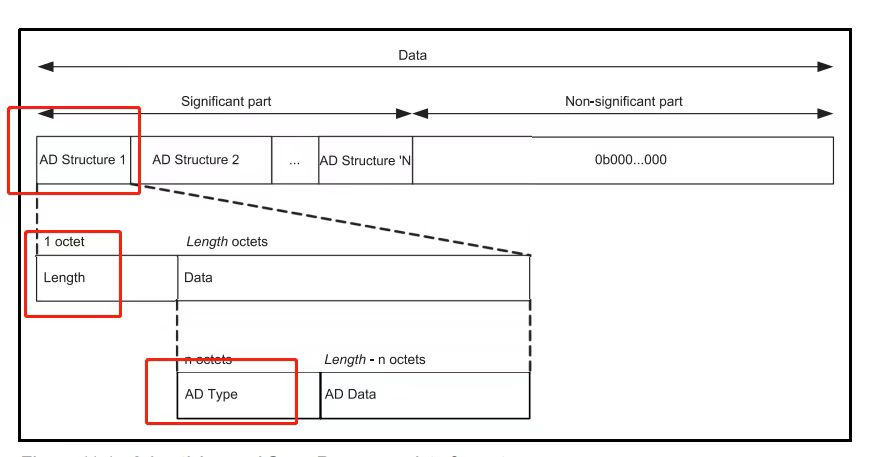
adv数据结构¶
#define PAN_SVC_CALL(opcode, p_data)
SVC_LL_ADV_DATA_FILTER # opcode filter adv data
typedef struct {
uint8_t enable;
uint8_t index; # increase 1 if you has enabled a filter obj
uint8_t len;
uint8_t type;
} adv_date_filter_t;
具体操作方法:
adv_date_filter_t fi;
adv_date_filter_t.enable = 1;
adv_date_filter_t.index = 0;
adv_date_filter_t.len = 0; // ignor len
adv_date_filter_t.type = 0x2B //ble mesh message
PAN_SVC_CALL(SVC_LL_ADV_DATA_FILTER, (void *)&fi);
4 系统中断优先级相关¶
系统优先级是一个需要注意的问题,因为 108X 系列的芯片是单核芯片,既要跑蓝牙协议栈也要跑复杂的任务,因此合适的优先级策略将会直接影响整个系统功能和性能。不同的中断本身原理不同,组合起来的情况非常复杂,这儿分几个典型场景解释一下怎样使用。
4.1 应用没有高精度定时的任务¶
该任务表示实际的场景可能是简单蓝牙的任务,上层定时器允许几百us误差,或者中断允许几百us延迟响应。
CONFIG_BT_CTLR_EVENTS_PRIO=1 #蓝牙调度事件处理的优先级
CONFIG_BT_CTLR_IRQ_PRIO=0 #蓝牙中断的优先级
CONFIG_CORTEX_M_SYSTICK_PRIO=2 #操作系统调度的优先级
上述的配置也是系统软件的默认的配置。
优点:功耗最低
缺点:需要牺牲一点上层事件的实时性
4.2 应用需要高精度的定时任务¶
该任务表示应用需要一个非常高精度的定时,例如键盘方案中,需要定时器调节灯效,需要 10us 的精度定时响应效果
CONFIG_BT_CTLR_EVENTS_PRIO=2 #蓝牙调度事件处理的优先级
CONFIG_BT_CTLR_IRQ_PRIO=1 #蓝牙中断的优先级
CONFIG_CORTEX_M_SYSTICK_PRIO=3 #操作系统调度的优先级
CONFIG_BT_LL_PREEMPTED_TIME_FOR_ONE_MSEL=220 #蓝牙提前产生中断的时间
##伪代码
APP_TIME_IQR_PRIO=0 #应用程序开启的定时器
上述的配置原理是通过CONFIG_BT_LL_PREEMPTED_TIME_FOR_ONE_MSEL设置蓝牙中断提前的时间(< 500us),即使蓝牙优先级不够高,但是牺牲了时间换了精度
优点:上层应用可以获得最佳的响应性能
缺点:功耗最高
